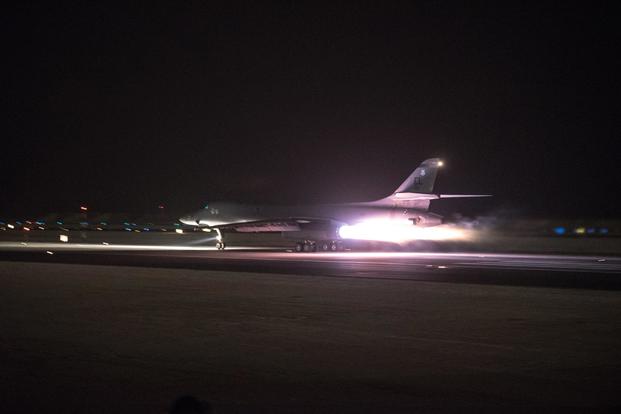U.S. and coalition forces recently doubled the number of airstrikes against Islamic State fighters in Syria in an attempt to help friendly Syrian ground forces defeat the last two pockets of terrorist resistance in the country.
In the past week, the coalition conducted 14 airstrikes against ISIS fighters in defensive fighting positions in Syria, Army Col. Ryan Dillon, spokesman for Combined Joint Task Force-Operation Inherent Resolve, told reporters Tuesday at the Pentagon.
"In the last two weeks, we as a coalition have conducted strikes and upped the number of strikes that we have conducted on the eastern side of the Euphrates River," he said. "We have doubled the amount since the week previously."
The Iraqi Air Force conducted one of the strikes on its own against a "known ISIS headquarters in Syria that was being used to smuggle ISIS terrorists," Dillon said.
"This strike demonstrated Iraq's willingness to do what is necessary to secure its citizens as well as their role as an important partner in the global coalition to defeat ISIS," he added.
The increased intensity of air operations was prompted by new intelligence from constant overhead surveillance platforms showing new activity of ISIS fighters in two locations in Southeast Syria along the Syrian-Iraqi border, Dillon said.
Aside from these last two pockets of ISIS, "[the fighters] are out in remote, sparse areas or they are hiding onesies and twosies amongst the population," he said.
The airstrikes are intended to support Syrian Democratic Forces who appear to be moving into the area to clean out pockets of ISIS fighters, Dillon said.
He would not give specifics but said there are "encouraging signs that more combat power is returning to the Euphrates River Valley to really turn it on [against] the ISIS elements in those two locations that finally remain."
"We have put obstacles into place and built things to contain ISIS in the two areas where we are currently supporting our forces to defeat the remaining locations where they hold territory," Dillon said. "We will continue to conduct operations that limit ISIS freedom of maneuver and also constrain their ability to generate forces and degrade their command-and-control nodes."
The SDF has been limited in its ability to conduct offensive operations since the February timeframe, Dillon said, but coalition leaders are confident they will continue to put pressure on ISIS until it is defeated.
"The SDF are that good," he said. "They have proven themselves again and again and again that they are capable of standing up to ISIS and defeating them."
-- Matthew Cox can be reached at matthew.cox@military.com.










